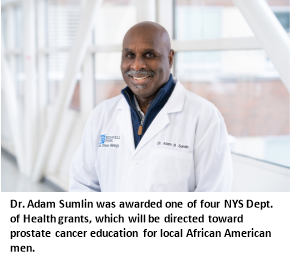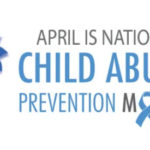Department of Health awards $650,000 to Roswell Park’s Adam Sumlin, PhD
- ‘Shared decision-making’ aims to equip men to make informed decisions
- Programs to focus on peer education, coaching, screening,
- early detection
Goal to engage 150 Black men, ages 45-69, each year for 5 years
BUFFALO, N.Y. — A program designed to help African Americans make informed decisions about prostate cancer early detection and treatment will expand in Erie County thanks to a New York State Department of Health (DOH) grant to Adam Sumlin, PhD, MBA, Assistant Professor of Oncology at Roswell Park Comprehensive Cancer Center. The grant — one of only four awarded in the state — provides $650,000 over the next five years through the DOH program Peer Education, Outreach & Shared Decision-Making for Persons at High Risk of Prostate Cancer.
 Anyone who was assigned male at birth and still has a prostate can get prostate cancer. African Americans have the highest incidence of prostate cancer in the world and are more likely than Caucasian Americans to die of the disease. They also tend to be diagnosed at a younger age.
Anyone who was assigned male at birth and still has a prostate can get prostate cancer. African Americans have the highest incidence of prostate cancer in the world and are more likely than Caucasian Americans to die of the disease. They also tend to be diagnosed at a younger age.
In an effort to reduce the death rate, five years ago Dr. Sumlin helped launch a series of programs for Black men to clear up misconceptions about prostate cancer and encourage early-detection testing that could catch the disease at a more treatable stage. The first presentation, held in downtown Buffalo, featured a panel of urologists who provided information and answered participants’ questions.
Some of those who attended said they had delayed getting a prostate-specific antigen (PSA) test that could diagnose the disease in its early stages. “They said, ‘Nothing has changed with me. I don’t feel anything different. I’ll wait until something happens and then address it,’” says Dr. Sumlin. “That understanding needs to be corrected. By the time you feel something, it’s too late. But if it’s caught early, it can often be cured.”
Of equal concern, some audience members had already received a prostate cancer diagnosis but did not fully understand the treatment they received or the terminology used during their care. That’s why the grant-funded presentations will emphasize “shared decision-making,” delivering the information patients need to make informed choices in consultation with their physicians and in line with their individual lifestyles and preferences.
After the first program, one of the participating urologists told Dr. Sumlin, who is African American, “We need a person of color to talk to men of color in the community, because they’ll listen more. They’ll see someone just like them talking about it, versus someone else coming in and saying, ‘This is what you should do.’”
Dr. Sumlin rose to the challenge. Since the first program in 2016, he has given invited talks at libraries, churches, the Niagara Falls Convention Center and other locations. He also recruited a cadre of African American prostate cancer survivors to share their own experiences during the programs. Those men — some representing the community prostate cancer outreach groups Men Allied for the Need to Understand Prostate Cancer (MANUP) Buffalo Inc., or US TOO — became a powerful group of patient advocates.
Dr. Sumlin says he was invited to apply for the DOH grant because he had already laid the foundation for the program through his work over the past five years. He collaborated with Ken Batai, PhD, Assistant Professor of Oncology at Roswell Park, in writing the grant proposal. He also enlisted as a consultant a researcher who specializes in prostate cancer health disparities among Black and Hispanic men — Adam Murphy, MD, MBA, MSci, Associate Professor of Urology and Preventive Medicine at Northwestern Medicine’s Feinberg School of Medicine.
The grant-funded program aims to provide outreach and education to 150 Black men, ages 45-69, for each of five years. Along with a formal presentation, each program will include peer education, personalized coaching and referrals to community services and healthcare providers for prostate cancer early detection.
Prior to the program, participants will be asked to complete a short survey to assess their understanding of prostate cancer and ways of detecting and treating it. A post-program survey will determine what they learned, and that information will be submitted to the DOH to gauge the program’s effectiveness.
“If the program goes well, they may want to adopt it throughout the state,” says Dr. Sumlin. “My goal is to get this program right to the top, not only in New York State but also other states.
“The connection of men of color is worldwide. We can provide the information and knowledge to help them have a better quality of life.”












